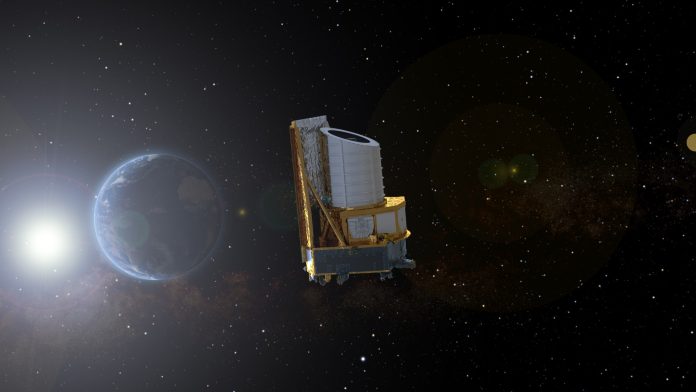Scientists at The University of Manchester are involved in an international satellite mission to map the dark Universe.
The European Space Agency’s (ESA) Euclid flagship Dark Energy Satellite Mission is due to launch from Cape Canaveral in Florida on a SpaceX Falcon 9 rocket on Saturday, 1 July 2023.
Euclid’s six-year mission is to map the dark Universe, using the positions of galaxies and images of dark matter produced from the gravitational lensing distortions of distant galaxies.
The maps contain information about the expansion history of the Universe and the evolution of the structure within it and by analysing these maps, astronomers will be able to determine the nature of both dark matter and dark energy.
Dark matter – which unlike normal matter does not reflect or emit light – binds together galaxies creating the environment for stars, planets and life, while dark energy is a mysterious new phenomenon which is pushing galaxies away from each other and causing the expansion of the Universe to accelerate.
The Euclid Consortium team, which includes scientists from The University of Manchester, will carry out a very precise and accurate analysis of the images and distances of 1.5 billion galaxies over one-third of the sky.
Euclid will also measure the spectrum of light from over 35 million galaxies to accurately measure their distance from Earth.
The University of Manchester will lead the work to understand the properties of galaxies that Euclid will study, including an investigation into how the first galaxies formed and developing and testing new methods for understanding the galaxy data when it arrives.
Professor Christopher Conselice of the University of Manchester, who leads the Legacy Science analysis for Euclid, said: “Euclid will change our entire view of the Universe. It will reveal the origin of the still mysterious dark energy, as well as provide us with data that will help explain the origin of stars, galaxies and planets. The importance of this mission cannot be overstated.”
Rebecca Bowler, a Research Fellow at the University of Manchester, who is leading the efforts to find the most distant galaxies with Euclid, added: “Euclid will revolutionise our understanding of how the very first galaxies and super-massive black holes are formed.”







